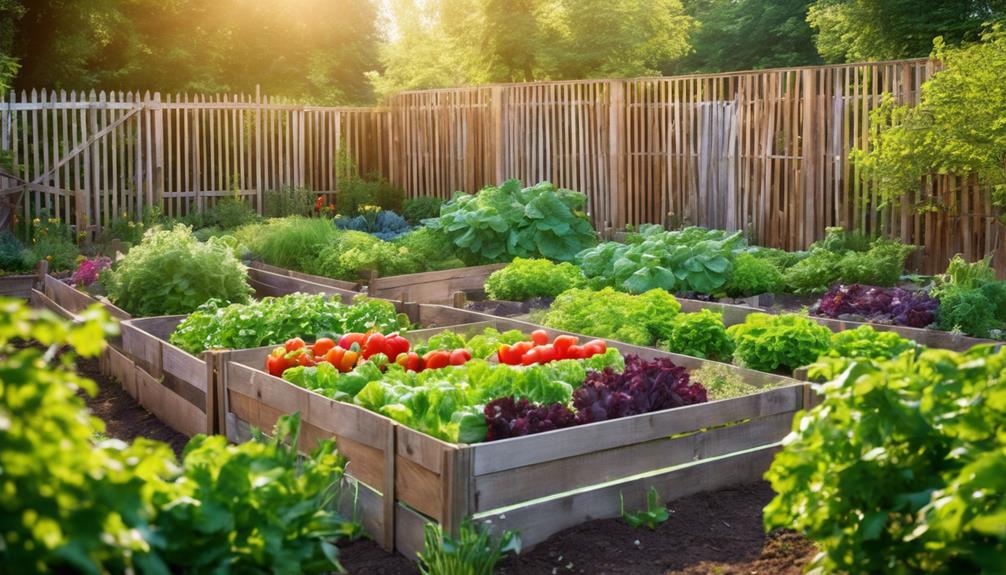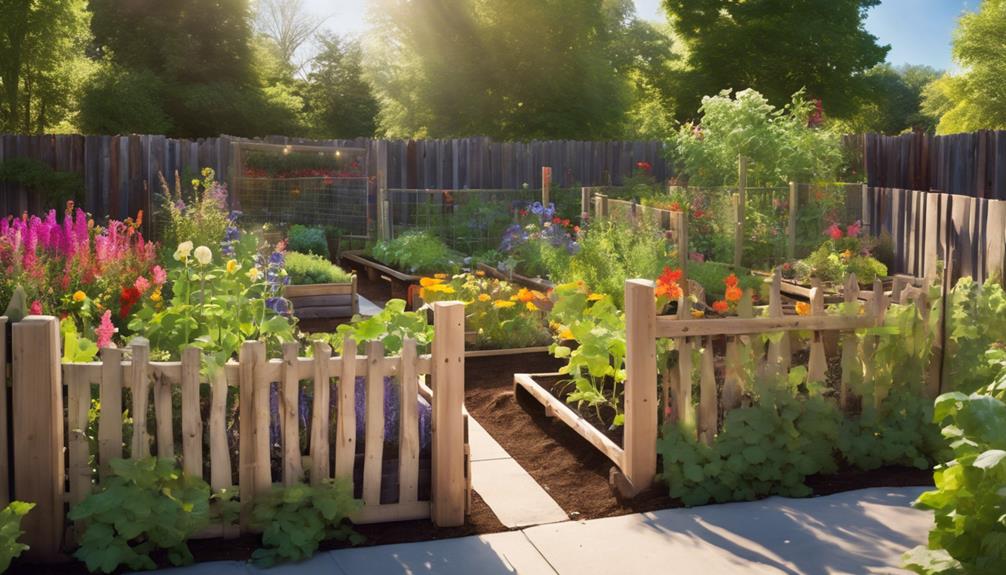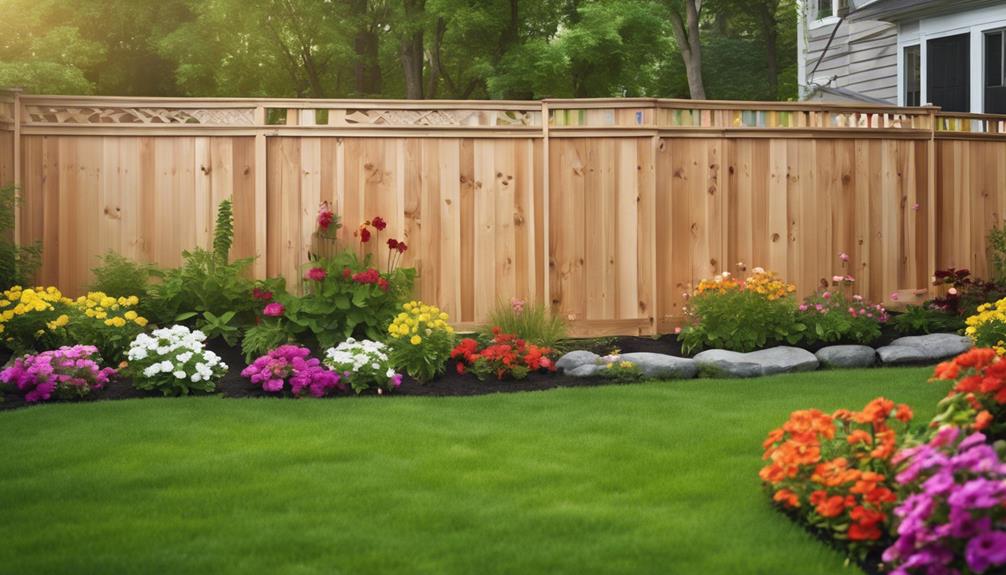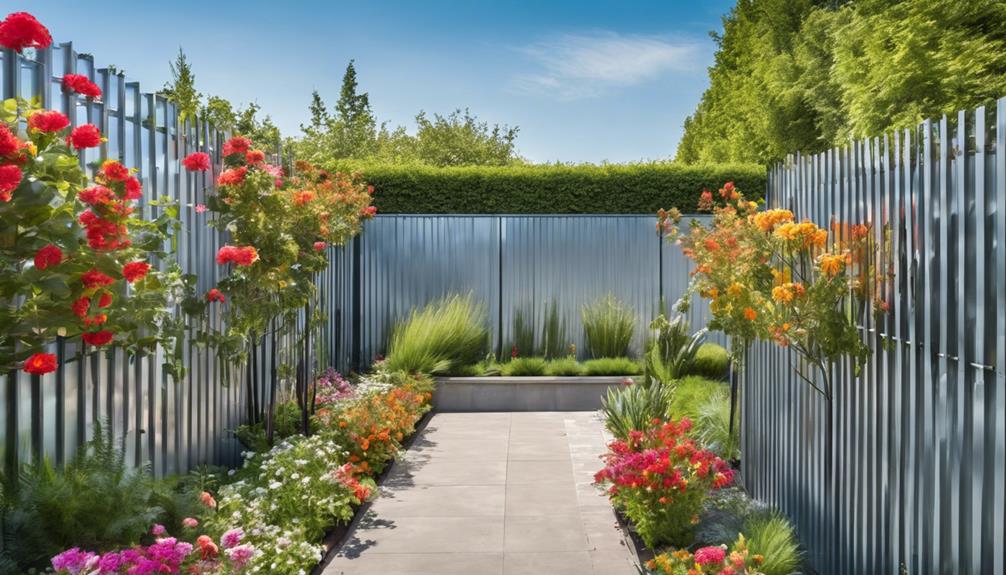5 Tips on Hourly Rates for Hedge Trimming
8 March 2025What Are the Benefits of Regular Hedge Trimming?
8 March 2025When considering durable fencing options for vegetable gardens, it is crucial to prioritise material strength and longevity.
Galvanised steel and treated wood offer excellent durability, while vinyl requires minimal maintenance and resists fading.
Composite materials combine aesthetics with decay resistance, and electric fencing serves as an effective deterrent for larger animals.
A minimum height of six feet is ideal for safeguarding against common pests.
Incorporating thoughtful design features, such as overhangs and drainage, can improve effectiveness.
Investigate these options further to find the perfect fencing solution tailored to your garden's specific needs and conditions.
Fencing Types for Garden Durability
When considering fencing options for vegetable gardens, it is crucial to evaluate the strength of the materials and their ability to withstand environmental factors.
Different materials offer varying levels of durability, which can significantly impact the longevity of the garden's protective barrier.
Furthermore, incorporating long-lasting design features can enhance the overall effectiveness and maintenance of the fencing, ensuring optimal protection for your plants.
Material Strength Comparison
A thorough material strength comparison is essential for selecting the most durable fencing options for vegetable gardens.
Different materials exhibit distinct strengths that influence their longevity and effectiveness. For instance, metal fencing, particularly galvanised steel, offers exceptional resistance to weathering and physical damage, making it an ideal choice for long-term durability.
Conversely, composite materials can provide a robust alternative, combining the aesthetic appeal of wood with improved resistance to decay and pests.
Wooden fencing, while traditional and often cost-effective, requires careful selection of treated varieties to withstand moisture and insect infiltration.
Vinyl fencing presents a low-maintenance, resilient option, resisting fading and cracking.
Each material's inherent properties must be carefully evaluated to align with specific garden needs and environmental conditions.
Long-lasting Design Features
Choosing the right type of fencing goes beyond material strength; it encompasses design features that contribute to long-lasting durability in vegetable gardens. Effective fencing should incorporate a robust framework, such as treated timber or galvanised steel, ensuring structural integrity against environmental stressors.
Additionally, a well-designed fence should include a height that deters both small animals and larger pests, with a minimum elevation of six feet. Incorporating a slanted top or overhang can also prevent climbing intruders.
Furthermore, consider drainage features to prevent moisture build-up and soil erosion around the base, which can compromise the fence's stability.
Lastly, utilising modular panels allows for future adjustments or repairs, ensuring that the fencing system remains adaptable and resilient over time.
Material Selection and Quality
When selecting materials for garden fencing, it is essential to take into account their weather resistance to ensure longevity and durability.
Furthermore, incorporating pest-resistant features can significantly enhance the effectiveness of the fence in protecting the vegetable garden.
Lastly, evaluating the ease of installation and flexibility of the materials will contribute to a more efficient setup process, accommodating various garden layouts.
Weather Resistance of Materials
Durability in fencing materials is critical for protecting vegetable gardens from harsh weather conditions. Selecting materials with superior weather resistance guarantees longevity and effectiveness in safeguarding your garden.
The right choice can withstand rain, wind, and extreme temperatures, preserving both the structure and the plants within.
Consider these vital factors when evaluating fencing materials:
- Moisture Resistance: Prevents rot and decay, extending the life of your fence.
- UV Stability: Keeps colours vibrant and prevents material degradation from sunlight exposure.
- Temperature Tolerance: Assures structural integrity during seasonal temperature fluctuations.
Mastering these aspects of material selection will not only enhance the durability of your garden fencing but also contribute significantly to the health and productivity of your vegetable garden.
Pest Resistance Features
A variety of fencing materials can provide crucial pest resistance features that are essential for maintaining the health of your vegetable garden.
Selecting high-quality materials can significantly reduce the risk of pest infestations, ultimately impacting your garden's productivity.
Consider these key pest resistance features when choosing your fencing:
- Durability to withstand gnawing: Robust materials prevent rodents from easily breaking through.
- Height and barrier design: Taller and strategically designed fences deter larger animals such as deer and rabbits.
- Natural repellents: Some materials, such as cedar, contain natural oils that repel pests.
Installation Ease and Flexibility
Choosing the right fencing material not only enhances the aesthetic appeal of your vegetable garden but also simplifies the installation process and provides flexibility for future adjustments.
Selecting materials known for their ease of use enables gardeners to boost their efficiency and creativity.
- Lightweight options facilitate quick setup and repositioning.
- Modular designs empower you to customise shapes and sizes effortlessly.
- Durable materials ensure that adjustments can be made without compromising structural integrity.
Choosing the Right Tools
Selecting the appropriate tools is essential for effectively implementing your fencing plan.
This encompasses gathering necessary materials, understanding optimal fence height guidelines, and considering the incorporation of electric fencing for enhanced protection.
Gather Necessary Fencing Materials
When embarking on the task of erecting a durable fence for your vegetable garden, it is essential to gather the appropriate materials and tools to ensure a successful installation.
Selecting high-quality materials not only guarantees longevity but also reflects your commitment to nurturing your garden.
Consider these important items:
- Sturdy fence posts: They provide the backbone of your fencing structure.
- Durable wire or mesh: This will keep pests at bay while allowing for air circulation.
- Weather-resistant fasteners: These ensure stability and can withstand the elements.
Optimal Fence Height Guidelines
Determining the ideal height for your vegetable garden fence is crucial for effective pest control and protection against larger animals. A fence that is too low may fail to deter common nuisances, while an excessively tall fence can disrupt the garden's aesthetics and accessibility.
Consider the following guidelines for the best fence height:
- Deer Protection: Aim for a minimum of 2.4 metres (8 feet) to keep these determined grazers at bay.
- Rabbit Resistance: A height of 0.9 to 1.2 metres (3 to 4 feet) is generally effective, as rabbits are excellent jumpers but not climbers.
- Rodent Deterrence: A fence should extend at least 15 centimetres (6 inches) below ground to prevent burrowing.
Mastering these height recommendations will ensure your garden flourishes, free from unwanted intruders.
Electric Fencing Integration
Incorporating electric fencing into your vegetable garden setup can significantly enhance protection against a variety of pests.
To ensure optimal effectiveness, selecting the right tools is essential. Consider the following factors when choosing your electric fencing system:
- Voltage Levels: Ensure the voltage is sufficient for deterring larger animals while remaining safe for smaller wildlife.
- Fencing Material: Choose durable, weather-resistant materials to withstand the elements and maintain functionality over time.
- Power Source: Decide between solar or battery-operated systems based on your garden's location and accessibility.
Cost-Effective Long-Term Investment
Investing in durable fencing for vegetable gardens is a strategic decision that can yield significant long-term savings. Although the initial cost may be higher than temporary solutions, durable fencing provides enhanced protection against pests and adverse weather, which reduces the need for frequent repairs or replacements. This investment ultimately results in lower maintenance costs and increased yield from healthier crops.
| Fencing Material | Initial Cost | Long-Term Benefits |
|---|---|---|
| Wood | Moderate | Natural aesthetics, sustainable |
| Vinyl | High | Low maintenance, rot-resistant |
| Metal | High | Longevity, security against larger animals |
| Electric | Moderate | Effective for deterrence, adjustable |
| Composite | High | Durable, resistant to warping |
Selecting the right fencing material can optimise both cost and effectiveness over time.
Garden Design and Layout
Effective garden design and layout play a vital role in maximising the benefits of companion planting, which can enhance plant growth and deter pests.
Furthermore, implementing seasonal crop protection strategies necessitates thoughtful fencing adjustments to safeguard vulnerable plants throughout the year.
Companion Planting Benefits
Companion planting offers numerous benefits that enhance both the health and productivity of vegetable gardens. By strategically selecting plant combinations, gardeners can create synergistic relationships that promote growth, deter pests, and optimise resource utilisation.
The following advantages exemplify the power of companion planting:
- Pest Deterrence: Certain plants naturally repel harmful insects, thereby reducing the need for chemical interventions.
- Enhanced Nutrient Uptake: Complementary plants can improve soil health and nutrient availability, promoting vigorous growth.
- Improved Pollination: Diverse plantings attract beneficial insects, increasing pollination and fruit set.
Embracing these companion planting principles cultivates a dynamic ecosystem in your garden, fostering resilience and maximising yields.
Mastery of these techniques will elevate your gardening practice and yield bountiful harvests.
Seasonal Crop Protection Strategies
A well-considered garden design can greatly enhance the effectiveness of seasonal crop protection strategies.
By thoughtfully planning your layout, you can create an environment that bolsters resilience against pests and environmental stressors.
Key considerations include:
- Strategic plant placement: Positioning taller plants to provide shade for delicate seedlings can mitigate heat stress.
- Companion planting: Utilising plants that naturally deter pests can minimise chemical interventions and promote biodiversity.
- Seasonal rotation: Implementing crop rotation not only protects soil health but also disrupts pest life cycles, boosting overall garden vitality.
Seasonal Fencing Adjustments Needed
Seasonal adjustments to fencing are critical for maintaining the integrity and productivity of vegetable gardens throughout the year.
As climates shift and different pests emerge, reevaluating your fencing strategy can protect your plants and optimise growth.
Consider these significant adjustments:
- Height Modifications: Increase fencing height in spring to deter jumping pests during peak growth periods.
- Material Changes: Switch to more robust materials, such as welded wire, in autumn to withstand harsh weather conditions.
- Temporary Barriers: Install flexible netting in summer to shield tender crops from birds and insects.
Pest Intrusion and Prevention
Pest intrusion poses a significant threat to the success of vegetable gardens, necessitating effective fencing solutions.
To protect against larger animals like deer, implementing deer-proof fencing is crucial, while gopher-resistant underground barriers can safeguard against burrowing pests.
Furthermore, trenching for gopher barriers enhances the overall effectiveness of these protective measures, ensuring a robust defence for your garden.
Deer-Proof Fencing Options
Implementing effective deer-proof fencing is crucial for protecting vegetable gardens from one of the most common and destructive garden pests.
A well-constructed fence not only safeguards your hard work but also enhances the overall integrity of your garden space.
Consider these durable options:
- Height Matters: Fencing should be at least 2.4 metres tall to deter jumping.
- Material Selection: Opt for sturdy materials such as welded wire or reinforced plastic that can withstand deer pressure.
- Electric Fencing: Incorporating electric fencing can create an additional psychological barrier, discouraging deer from approaching.
Gopher-Resistant Underground Barriers
A robust defence against gopher intrusion is essential for maintaining the health and productivity of your vegetable garden.
Gophers pose a significant threat, as their burrowing can destroy roots and undermine soil structure. Implementing gopher-resistant underground barriers can effectively mitigate this risk, allowing your garden to thrive.
Consider the following benefits of such barriers:
- Enhanced Root Protection: Safeguard your valuable plants from destructive tunnelling.
- Soil Integrity Maintenance: Preserve the foundation of your garden, ensuring ideal growing conditions.
- Long-term Investment: A durable barrier minimises future pest control costs and effort.
Trenching for Gopher Barriers
Creating an effective gopher barrier begins with proper trenching techniques. The depth and width of your trench are vital to thwart these persistent pests. Aim for a trench that is at least 60 centimetres deep and 30 centimetres wide, ensuring you use sturdy materials like wire mesh or hardware cloth to line the trench.
Consider these important aspects for the best results:
- Physical Protection: Prevent gophers from tunnelling into your garden and damaging your hard work.
- Long-term Investment: A well-executed trench provides lasting defence, saving you from future expenses.
- Peace of Mind: Cultivate your garden with confidence, knowing you've taken significant steps to deter intruders.
Master these techniques for a thriving, gopher-free vegetable garden.
Why Choose TKL Birmingham Gardener
When selecting a gardening service, TKL Birmingham Gardener stands out for its commitment to quality and customer satisfaction.
With a team of highly skilled professionals, TKL Birmingham Gardener offers tailored solutions that meet the specific needs of vegetable garden enthusiasts. Their expertise in durable fencing options ensures that your garden is not only protected but also aesthetically pleasing.
By employing premium materials and cutting-edge techniques, they provide long-lasting solutions that can withstand environmental challenges. Additionally, their thorough consultation process empowers clients with knowledge, allowing for informed decisions that enhance garden productivity.
Common Garden Fencing Questions
Understanding the distinct aspects of garden fencing is vital for any vegetable garden enthusiast looking to safeguard their plants and enhance their growing environment.
Common questions often arise regarding the best materials, height requirements, and installation techniques. Many gardeners inquire about the effectiveness of different fencing types against various pests, such as rabbits or deer.
Moreover, queries about maintenance and longevity of materials, like wood versus metal, frequently surface. Compatibility with local regulations and aesthetics is also a concern; understanding zoning laws can prevent future complications.
In addition, determining the ideal fence height to deter specific animals is significant, as it varies by species. Addressing these questions thoroughly equips gardeners with the knowledge to make informed decisions about their fencing choices.
Final Thoughts on Fencing
Many gardeners find that investing in the right fencing can greatly improve the health and productivity of their vegetable gardens.
The choice of fencing is not merely a practical decision; it reflects a commitment to nurturing your plants and safeguarding their growth.
Consider the following emotional benefits of a well-chosen fence:
- Peace of Mind: Protect your hard work from pests and intruders.
- Enhanced Growth: Create a thriving environment for your vegetables to flourish.
- Aesthetics: Enhance the beauty of your garden space while ensuring functionality.
Ultimately, the right fencing serves as both a barrier and a foundation for a successful vegetable garden.
Invest wisely, and you will reap the rewards in abundance, enjoying the fruits of your labour with confidence and pride.




